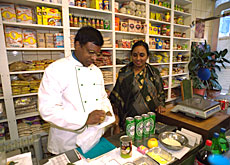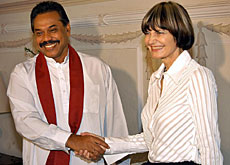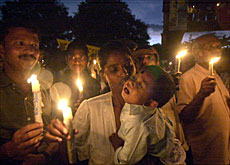Swiss Tamils look to preserve their culture

Tamils first came to Switzerland in the 1980s as refugees fleeing civil war in Sri Lanka and now make up a sizeable community in the country.
Although they encountered prejudices at first, Tamils are now regarded as having adapted well to their new home. But they are still not fully integrated.
In 1983 the Tamil Tigers group began fighting for a separate homeland for ethnic Tamils in Sri Lanka, claiming discrimination by the majority Sinhalese. The conflict escalated and many Tamils fled abroad to Europe and North America.
An estimated 35,000 Tamils now live in Switzerland, of which ten per cent are naturalised Swiss. The ex-pat community is now one of the largest after those in Canada, Germany and Britain.
However, the arrival of Tamils in the mid-1980s was not without consequences. The authorities were forced to set up a special refugee authority in 1986 to cope with the unprecedented deluge of Tamil asylum seekers. Prejudice and xenophobia were also commonplace.
“The reception was very harsh, very aggressive, and for us it was also the first time we had been to Europe and experienced the cold snow,” said Anton Ponrajah, the head of the Swiss Federation of Tamil Associations.
“For both sides it was a difficult situation.”
Distrust
He said that some Swiss distrusted the Tamils’ motives at first.
“In earlier times, when we were in the asylum centres, people thought we were taking their tax money… but later on the government allowed the refugees to work in Switzerland and this tendency changed,” he told swissinfo.
The Tamil population have built up a reputation as good workers, particularly in the hotel and catering industry, which has helped integration.
The community is also well organised. In some cities there are regular showings of Tamil-language films, Tamil newspapers are freely available and there are now more than 20 Hindu – the main Tamil religion – temples and a string of grocery shops across the country.
Deceptive appearances
But appearances can be deceptive, warns Damaris Lüthi, an ethnologist at Bern University, who has just published a study on Tamil integration in Switzerland.
Lüthi says that from a structural point of view, Tamils are well integrated. They know how to negotiate the education and health systems and the workplace.
But she says socially and culturally it’s a different story. Contact tends to take place within the community and Sri Lankan values are still valid, especially for the first generation.
“The confrontation [between their values and those of] Switzerland and the West in general is still difficult,” Lüthi told swissinfo.
“Even for those who have lived in Switzerland for 20 years, alcohol consumption, divorce and sex outside marriage, for example, are still very stigmatised and considered to be immoral.”
Old ways
The second generation is better integrated but many still subscribe to the old ways, even if they have no intention of returning to Sri Lanka, says Lüthi.
This can be seen in attitudes towards marriage. Most weddings still take place between people of the same social caste – despite moves in Sri Lanka to outlaw the caste-system.
“If two young people from different castes get married, they are often isolated,” Lüthi explained. “And even when love marriages are spoken of, they are normally between the same caste.”
Unions between Tamils and Swiss are very rare. At the end of 2004, among the 18,000 married people of Sri Lankan origin, only 521 had a Swiss spouse.
“These types of marriages are not well accepted,” said Lüthi, citing several examples of when Tamil families have cut ties with their children for marrying outside the community.
For Ponrajah, integration is still an ongoing process.
“It’s not a tablet that you can swallow and it will work – it will take time to understand each other. This is the basic thing for integration.”
swissinfo
According to 2004 figures: more than 35,000 Sri Lankans, mostly Tamils, live in Switzerland.
31,961 have residency, 2,996 are asylum seekers and 541 refugees.
In 2004 1,563 Sri Lankan gained Swiss citizenship.
85% of Tamils living in Switzerland are Hindu, the other 15% are mostly Catholics.
The mass exodus of Tamils from Sri Lanka began in the mid 1980s after civil war broke out in the country.
The conflict killed nearly 65,000 people before a Norwegian-brokered ceasefire in 2002.
It is estimated that around half a million Tamils have left their homeland. In 1981 there were 1.9 million living in Sri Lanka.
The Swiss Tamil community is well organised and maintains strong links to the home country.

In compliance with the JTI standards
More: SWI swissinfo.ch certified by the Journalism Trust Initiative


You can find an overview of ongoing debates with our journalists here. Please join us!
If you want to start a conversation about a topic raised in this article or want to report factual errors, email us at english@swissinfo.ch.